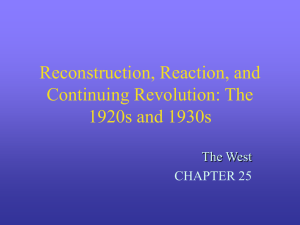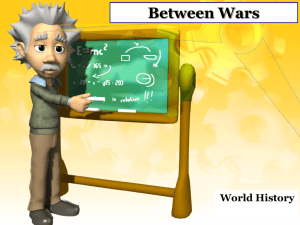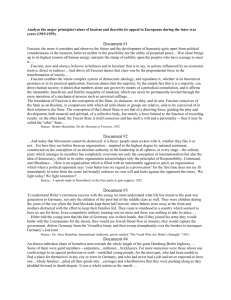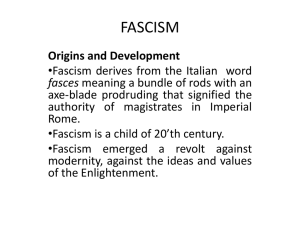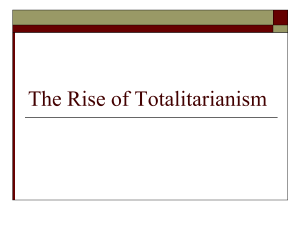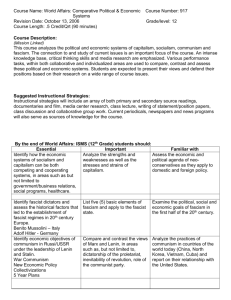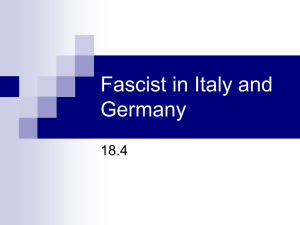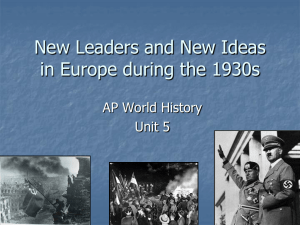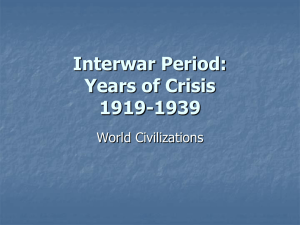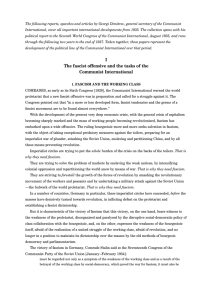Postmodern fascism - MSSR Electronic Books
advertisement
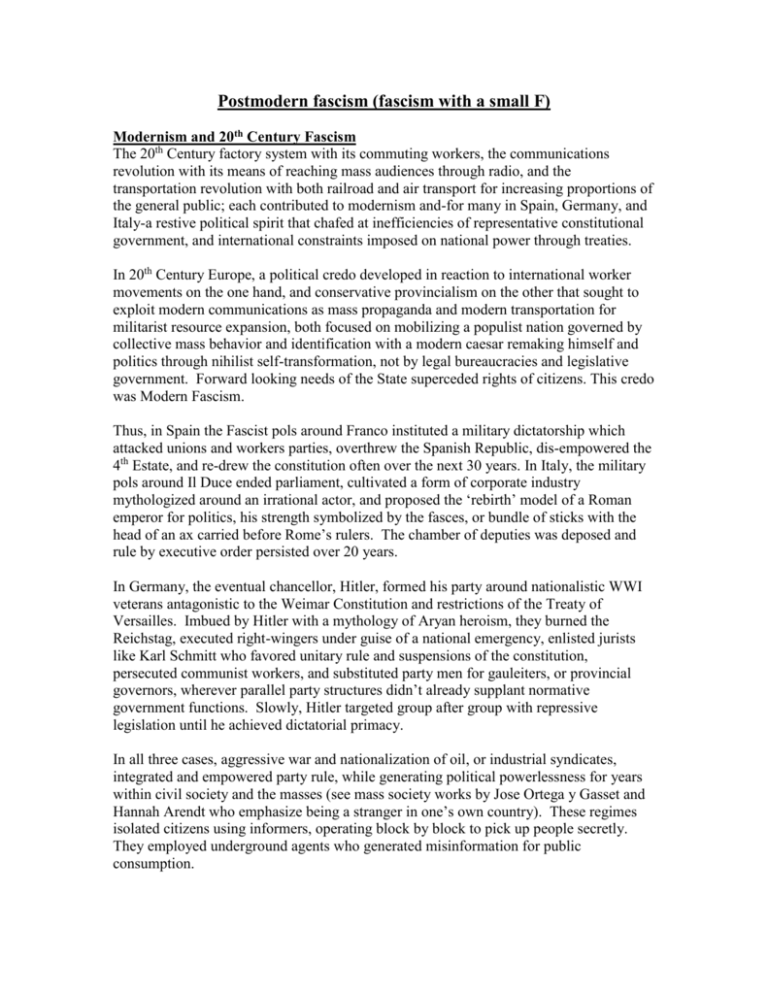
Postmodern fascism (fascism with a small F) Modernism and 20th Century Fascism The 20th Century factory system with its commuting workers, the communications revolution with its means of reaching mass audiences through radio, and the transportation revolution with both railroad and air transport for increasing proportions of the general public; each contributed to modernism and-for many in Spain, Germany, and Italy-a restive political spirit that chafed at inefficiencies of representative constitutional government, and international constraints imposed on national power through treaties. In 20th Century Europe, a political credo developed in reaction to international worker movements on the one hand, and conservative provincialism on the other that sought to exploit modern communications as mass propaganda and modern transportation for militarist resource expansion, both focused on mobilizing a populist nation governed by collective mass behavior and identification with a modern caesar remaking himself and politics through nihilist self-transformation, not by legal bureaucracies and legislative government. Forward looking needs of the State superceded rights of citizens. This credo was Modern Fascism. Thus, in Spain the Fascist pols around Franco instituted a military dictatorship which attacked unions and workers parties, overthrew the Spanish Republic, dis-empowered the 4th Estate, and re-drew the constitution often over the next 30 years. In Italy, the military pols around Il Duce ended parliament, cultivated a form of corporate industry mythologized around an irrational actor, and proposed the ‘rebirth’ model of a Roman emperor for politics, his strength symbolized by the fasces, or bundle of sticks with the head of an ax carried before Rome’s rulers. The chamber of deputies was deposed and rule by executive order persisted over 20 years. In Germany, the eventual chancellor, Hitler, formed his party around nationalistic WWI veterans antagonistic to the Weimar Constitution and restrictions of the Treaty of Versailles. Imbued by Hitler with a mythology of Aryan heroism, they burned the Reichstag, executed right-wingers under guise of a national emergency, enlisted jurists like Karl Schmitt who favored unitary rule and suspensions of the constitution, persecuted communist workers, and substituted party men for gauleiters, or provincial governors, wherever parallel party structures didn’t already supplant normative government functions. Slowly, Hitler targeted group after group with repressive legislation until he achieved dictatorial primacy. In all three cases, aggressive war and nationalization of oil, or industrial syndicates, integrated and empowered party rule, while generating political powerlessness for years within civil society and the masses (see mass society works by Jose Ortega y Gasset and Hannah Arendt who emphasize being a stranger in one’s own country). These regimes isolated citizens using informers, operating block by block to pick up people secretly. They employed underground agents who generated misinformation for public consumption. 20th Century Fascism had its definitive political features supplanted in the public mind, after WWII, by its emergent features of dehumanization, racism and genocide, and many today cannot distinguish it from reactionary political forces Modern Fascism opposed, totalitarian political forces of communism it opposed, or recognize its future-looking mindset as fully modernist, the latter feature being why some American industrialists, investors, and efficiency experts like Henry Ford, Charles Lindberg, and investor Fritz Thyssen--who was central to the Bush family fortune--were initially supportive of its regimes.* Postmodern fascism "When fascism comes to America, it will be wrapped in the flag, carrying a cross" from 'It Can't Happen Here' 1936 ~ Sinclair Lewis The 21st Century US service economy based in consumerism, its corporate-owned broadcast and tape technology permitting alternate realities through video and sound 24/7, and mass transportation of information by the internet and the population by jet airliner collapsing the social restrictions of space; all contributed to a post-modern experience—though ersatz—of a global village where belonging to a nativist hegemony of consciousness became popular in America. Cultural products proliferated, reactionary debates over their contents fueled a national dis-ease with free speech, the relativism of postmodernism, and a recourse for controlling them and human diversity itself was sought through a minimalist national identity under a solidary federal leadership. In politics, the last forty years of the 20th Century in America saw the regional inversion of its party system, with a largely Democratic and rural South becoming Republican, with the urban social welfarism of Presidents Roosevelt through Johnson increasingly marginalized. The activist Moral Majority political movement in the 1980’s (culturally grounded in the Southern Baptist cross of Jesus) coalesced with the Republican Party and the US military establishment (flag-waving nationalism), centered in the South before the Reagan administration. Under Newt Gingrich’s Contract with America at the end of the century, this cultural entity was re-integrated into a legislative majority with states rights federalists, with Libertarian minimalists, and with global and risk-adverse, corporate business interests. So, as the 21st Century evolved, majority US politics became more reactionary, corporatist, fundamentalist, nationalist, and militarist than many European nations that had joined as Allied Powers to fight WWII against Modern Fascist states (Note: Europe has more specialized, less consensus based right wing groups, articulated with its multiparty parliaments). In Sinclair Lewis’ formulation, these conditions were ripe for an American fascism such as flourished briefly in the early 20th Century, evidenced by the popular appeal of the KKK, American eugenics, and America’s initial, and bigoted fulllength film, “Birth of a Nation.” The 9/11 attacks by fundamentalist sects of Islam in 2001 set the post-modern conditions for a national religious reaction following the ideological election of G.W.Bush and Richard Cheney, and the Neo-Conservatives who staffed nearly all the top political positions. ‘Sacred’ flags flew by the thousands after the 9/11 attacks. National mobilization even included ‘PATRIOT’ as an acronym for removing citizen rights through one party rule in congress, religious-like obedience was prescribed even for fundamental tenets of economics and party loyalty, secularism was decried publicly while the government funded religious activities, and the Executive took on the model of a man who would be king, Caesarion, Bush’s image the coin of the realm. The Postmodern fascist policies of the Bush/Cheney government—with a small F—are those antagonistic to checks and balances in constitutional government, the restraint of privacy rights in the lives of its citizens, the constraints of international agreements including restraints on pre-emptive war and inhumane treatment of prisoners, and all while promoting a counter-democratic doctrine called the ‘unitary executive’ which swallows up competing branches of government in a sustained nationalist ‘military emergency.’ In the last two years of this government, corporatism became more evident in no-bid military and re-construction contracts, vast cost over-runs and corporate theft, privateering, and state involvement of corporations in illegal activity. Sanitized as ‘leadership’ in American media, Bush & Cheney have provoked strong negative reactions around the world, and generated European political tensions between ruling parties and resurgent fascist parties in Belgium, Austria, France, Germany, and Italy (See Robert Paxson’s The Anatomy of Fascism, Knopf, 2004). Legislative and Judicial branches of government are targets of the Executive, not coequal branches, and the Constitution itself, as well as many state constitutions are marginalized. The UN and international bodies are subverted even in matters of warmaking powers, crime, and environmental emergency. Modern Fascism promulgated similar central ideas while dismantling the democratic institutional structure of their republics, and historical linkages do exist to current models of analysis. Neo-Con political philosophy, for example, traces back through Leo Strauss to Nazi Jurist Karl Schmitt (read Leo Strauss, Fascist Godfather of the Neo-Cons by Jeffrey Steinberg, and Heinrich Meier’s Carl Schmitt and Leo Strauss: The Hidden Dialogue). Read Carl Schmitt’s Critique of Liberalism, John McCormick, Cambridge, 1999 to understand Postmodern fascism’s appeal to traditionalists. But Postmodern fascism in America need not engender the dehumanization, racism, and genocide Modern Fascism did, at least while warfare does not animate and motivate the vast body of the US population; at least while party parallel structures and appointments do not eclipse civil service functions, or until prerogatives of the Executive enforce substantive executive orders of military ‘expediency’ towards sub-groups and occupied populations. Remember, ‘The Party of Lincoln’ ameliorated some cultural traits of the American South even as it consolidated it politically. This fascism, for the present, has a small F. The postmodern features of American fascism, however, deserve attention for their intensification of emotional devotion through religion and its fundamentalist economics which model a kind of social desperation many remember from childhoods of scarcity in the Great Depression (In “The 14 Defining Characteristics of Fascism” by Eric Blumrich, religious devotion is exploited by Modern Fascist leaders, but does not really constitute a political theology as it may for a Postmodern fascism surging ahead of Europe in economic imperialism as well as invasions). “No work, no eat” is perhaps the earliest expression of the oikos in the New World, in Pieter Stuyvesant’s Nieu Amsterdam. One must obey orders or risk hunger. Calvinist humiliation in Massachusetts’ stocks, social ostracism of large parts of the population in all-seeing prisons in Pennsylvania, and the torture of evil witches in Salem; these are the historical roots of religious sensitivity which Postmodern fascism exploits. Even America’s video games and crime dramas on TV keep these ideas alive, and they feed the torture, illegal detention, and rendition features of American fascism. Without such fundamentalist post-modern cultural elements it is difficult to explain how rapidly the US population enured itself to human suffering and turned away, or how one third of US soldiers now approve of torturing prisoners to exact a ‘truth’ only a true believer can accept, making ‘secure’ his special group. The resurgence of congressional democracy over Postmodern fascism is already begun. The ranks of high-level true believers in the Neo-Con cause is being depleted through attrition at the polls, conviction of crimes, resignations, and incarcerations. Living up to their well-advertised low expectations also appears a significant dimension. Civil society and professional associations become more informed about Neo-cons with every book published, and every citizen’s rally held in opposition. See Anne Norton’s Leo Strauss and the Politics of American Empire, Yale Press, 2004 which divides Strauss acolytes or Neo-Con believers in nature as selfevident and leaders as patriotic princes on an exclusionary crusade, from their philosophical teachers who did “keep faith with learning” in some fashion. She warns broadly of their international impact, “We have licensed anti-Semitism at home, and funded it abroad.” But the Constitutional challenges to this Postmodern fascist regime are barely begun. The US judiciary has been politicized, intimidated, and deprived of basic legal principles. Legislatures are bound by party-centered survivalist thinking, rejecting citizen sovereignty and the only Constitutional means of dealing with abuses of power, impeachment, while hamstrung by simple majorities well below a potential to override vetoes. Southern religious communities have provided strong voter support for a regime without separation of Church and State, with only recent attrition by Northern and American Baptists. The 4th Estate diminished reporting of priority news about the state of the union and foreign policy years ago, and journalism is administered not as a citizen’s instrument of reform, but as a purveyor of entertainment for consumers of political pap, while buying toothpaste. Nothing short of removing oaths of loyalty to a fascist leader and replacing them with the oath of office to a re-invigorated constitution is likely to compromise the process and objectives of Postmodern fascism. ----------------------------------------- Prepared by Bruce Russell Sr. and updated with material from a WWII survivor in occupied Northern Europe in June, material on Neo-con politics, and corporatism in August of 2008. *Source is John Buchanan, author of Fixing America, from the Harriman Papers in the US Library of Congress.
